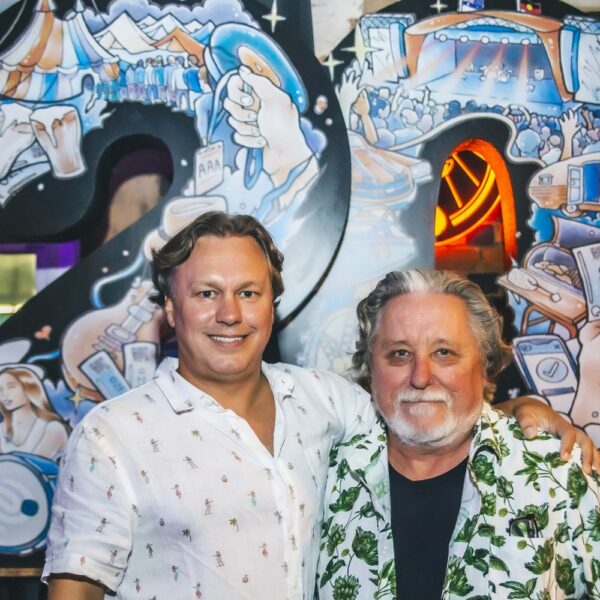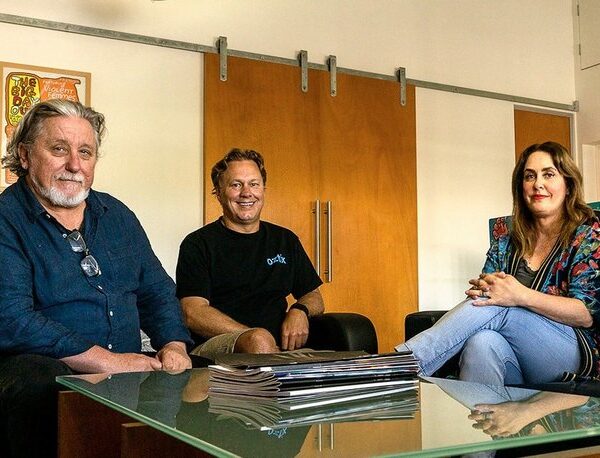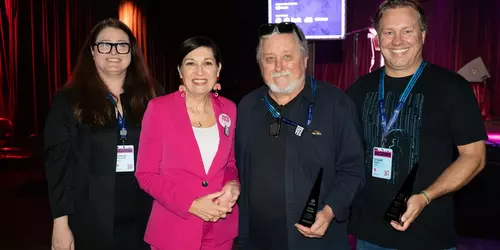The Little Indie That Could: How Oztix Turned Loss Into Gain and Became Australia’s Biggest Independent Ticketer

There’s no shortage of souvenir eye candy on a visit to Oztix’s new headquarters in Brisbane. Posters of legendary line-ups decorate the offices in Woolloongabba, from Big Day Out to Livid Festival, Splendour In The Grass, Harvest, Soundwave.
In the boardroom hangs a piece of the past that informs us of today.
It’s hard to miss the oversize voting card, featuring four preferences: Barry, the face of Ticketmaster; James for Ticketek; Rupert, the chief of Moshtix; and Brian, a cuddly koala, representing Oztix.
Instant giggles aside, the card could be a tarot, a message wrapped in a lesson.
Fast forward to 2024, Barry Diller is no longer the face of Ticketmaster (now part of Live Nation). James Packer is on his superyacht, somewhere, and has no ongoing alliance with Ticketek (now part of TEG). Rupert Murdoch sold Moshtix some years ago (now affiliated to Ticketmaster).
Brian Chladil, however, is still very much at the helm of Oztix, a business that, more than 20 years after selling its first gig ticket, can claim to be Australia’s leading independent ticket seller.
On its 20th anniversary, in 2023, Oztix, expanded with the acquisition of Local Tickets, a smaller, rival ticketing agency specialising in local events across the country, which rebranded to Localtix,
The business moved to those new premises, won an award. Sold millions of tickets.

Oztix’s Stuart Field and Brian Chladil
Chladil, known as “Smash” to the music industry, on account of seven youthful motorbike accidents in the space of a single year (he still rides), is a music lifer who, before all of this, was a sound guy with his own PA system, and Stuart Field, a hard rock maven.
When he first met Smash, Field was just 20 years of age, a festival intern working gates at Livid Festival, the once-iconic Brisbane-only festival which hosted performances from Beastie Boys, Henry Rollins and others, before it expanded to Sydney and Melbourne in the early 2000s and came unstuck. Smash was 25, and the event manager.
The pair formed a solid bond and worked tother for five years as site and festival manager for major festivals, Schoolies Week, the Olympic Torch Relay.
The idea for Oztix was sparked by managing the BDO. Two years on, the ticketing startup was operational.
Oztix’s origin story isn’t unusual. In those early days, tickets changed hands under Smash’s house in Indooroopilly, a spot popular with university students in Brisbane’s inner-west. Business expanded, and several years on an upgrade, to a rented space in Paddington, which the company soon outgrew.
The banks wouldn’t initially get involved because e-commerce was, then, considered too risky. Stuart’s father Bruce Field pitched in $150,000 as security for the bank, so they could get that merchant and start shifting tickets.
For 2023, the business shifted roughly 2 million tickets. Across its history, Oztix has sold 28 million tickets.
Chladil spotted the e-tail boom early. Online purchases would, naturally, extend to ticket buyers, he figured. It was only a matter of time before bands, concert promoters and event organisers made the transition.
“Our idea was to have what actually Eventbrite came out with years later,” notes Chladil, “an online platform, you log in, you do everything yourself, you put your own branding on it. We just sat in the back and made sure it all works. The joke was we’re all going to sit on the beach in Thailand, watching the money come in. Did we ever sit back and relax? No, that never happened at any stage.”
The team identified “pretty quickly” an entire market in the middle that wasn’t being serviced. Brisbane’s 500-capacity The Zoo came on board. Followed by The Great Northern (550 capacity) in Byron Bay.
“Our strategy was empowering the bands and venues to sell their own tickets,” says Chladil.
“So instead of the traffic going to Ticketek or Ticketmaster, where they’re promoting other events, it was like, why don’t you drive traffic to the band’s own site to get exposure to the merch, and the venues for your other shows. And that was our point of difference.”
A “white label machine,” a B2B platform where “you can use our engine and use your own branding.”
Business snowballed, festivals went digital and many turned to Oztix. “We couldn’t keep up for a couple of years,” notes Chladil. “We just had a continual roll of expansion, expansion. We never really took the money out. We just reinvested it, put the money back in and hired more staff got more tech, got bigger and bigger and bigger.”
Tech businesses that sit still aren’t in business for long. Four years ago, Oztix moved its digital machinery to the cloud, and some $2 million is spent each year on tech updates. It’s an ongoing investment. “We’ve rebuilt our system five times now, because technology changes so much,” explains Field.
“At any given time,” Oztix commercial director Seth Clancy told industry guest at a launch function at the new HQ in 2023, “the business boasts 4,000 events on sale across the country across both platforms” and delivers 100-plus major events onsite each year.
Its platform handles more than 5.5 million customers, upwards of 3 million opt-in customers which the ticketing specialist communicates with regularly, and its marketing system is underpinned by more than 20 million datapoints.

Oztix’s Brian Chladil, Stuart Field and Kristen Goldup
As part of that arrangement with Local Tickets, all its employees joined its new parent, Oztix events are now populated across an additional 70 local ticket marketplaces, and Local Tickets founder and CEO Kristen Goldup serves as brand director across Oztix and Localtix.
Following that acquisition, the business counts over 50 Australian-based staff and hundreds of contractors each year, and expected to inject over $350 million into the Australian economy last year, working with a raft of industries including venues, music, lifestyle, tourism, sporting and communities.
All good stories have a twist. Festival-land is one dark turn. Specifically, the BDO and Soundwave. When BDO disappeared from the landscape in 2014, a void was created where once 330,000 tickets were sold. Soundwave, at the peak of its powers, pulled numbers in the high 200,000s.
“We’ve had a great success story, but we’ve had some massive hurdles,” says Chladil. “And one of them was when the festival market went belly-up.”
Those two clients represented 50% of Oztix’s business. “We took a massive hit. Within probably 15 months, we lost 50% of our income.”
Oztix pivoted. At that point, “we started diversifying, we looked away from music and towards exhibitions and other types of revenue.”
If BDO, Soundwave and the crashing festivals market was bad, worse was yet to come.
When the pandemic swept through in March 2020, Oztix lost its revenue. “There were no sales, there was no income. But we still had to settle shows,” recounts Chladil.
The day after then-prime minister Scott Morrison called the shutdown, staff were confronted by some 5,000 emails from customers. Chladil has a photo which captures the worst of times. A big screen in the office, which, during happier times, tracks the number of tickets sold that day. On one occasion, the screen showed a single digit, 1.
“We had to stand all of our staff down. That was the hardest thing we’ve ever done in our lives. And that night, all the team got on a Zoom party, everyone got drunk and cried and laughed and everyone was there saying how they’re going to turn up to work the next day.”
One by one, hangovers fresh, the team turned up to work the following day. This before JobKeeper kicked in.
That indie spirit carried the team through, Chladil notes.
The leadership repays the faith by sharing equity in the business with key staff, a practice that has been shown to reduce churn, and keep operations running smoothly.
“One of the benefits of being able to maintain our team was when COVID lifted,” he explains. “We were able to hit the ground running. And we had a big capable team ready to go. One of the companies didn’t, and they suffered. And we mopped up a lot of new business because of it. We gave it a crack. We’re back.”
Though tickets are flying, there’s still some challenges in the market. “The smaller venues are really suffering. We really try to help them and prop them up, because there’s so much festival traffic happening again. And big tours,” says Field. “A lot of the big touring bands are either doing festivals or supports. So they’re not actually doing their own tours. The problem is the small mom and pop venues are missing out on the touring acts. They’re not hitting the target for what they need to survive.”

(L-R) Natalie Strijland (president of QMusic), Hon Leeanne Enoch MP (minister for Qld Arts), Brian “Smash” Chladil and Stuart Field (Oztix co-founders).
As the business celebrated its 20th anniversary, QMusic last year tapped Smash and Field with the award for Outstanding Contribution to the music industry.
Natalie Strijland, president of QMusic, and Hon Leeanne Enoch MP, minister for Queensland Arts, were on hand to present the award on the eve of Bigsound, for which Oztix can now boast a 15-year partnership.
“We thought it was important to acknowledge the incredible contribution our two Queensland ticketing pioneers have made to the music industry,” remarks Strijland. “We are fortunate to have had their support.”
There’s a muted buzz in town, a hum. This is an Olympics year, with Paris hosting the party. Los Angeles is next, followed by Brisbane.
Will Oztix get involved in the greatest circus of sport and entertainment on the planet? “We may, it’s early days,” Chladil admits. “We put the feelers out.”
The future is a connected one, connecting punters in the regions and the main metro centres with entertainment, working with venues all of description, from those mom and pop spots, to racecourses, wine festivals and more.
“Sure. It’s profitable,” Chladil says of the business. “I’m very proud of the fact that it’s profitable, and that it’s successful. I don’t have any-hang ups about that anymore. I used to be quite embarrassed about how successful it was going for a while. Not anymore. We’ve done 20 years of really hard work to be successful. It doesn’t come easy. It’s all about getting up every day and doing it again and that perseverance pays off. What I’m most proud of is the fact that we just kept getting up and doing it and here we are now. It’s unreal.”






























